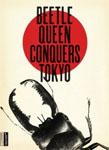 |
|
||||||||||||||||||||||||||||||||||||||||||||||||||||||||||||||||
 Beetle Queen Conquers Tokyo Beetle Queen Conquers TokyoIf we expected an in-depth look at Japanese culture and its people's fascination with insects, I suppose we must be satisfied with the filmmaker's visual anthropology. There are many arty shots in the film, that's for sure, but they do not synergize into a narrative, nor do they create lyric intensity. With the emphasis on quoting snippets of Japanese literature, I suspect the latter, lyric mode was Oreck's intention. I don't think it works. The film is dry, full of lush (and creepy, no doubt, to the insectophobe) close-ups that ground us in nothing and leave us nowhere. It's possible the reason for this failure is that the film appears to have been made for Japanese TV. Natch, there's a lot of things you wouldn't show or say if you were, so to speak, preaching to the converted, or telling the tellers their own tale. Especially if you are an outsider. But Oreck wrote the film as well as directed it, so whatever happened in translation happened under her nose. Gaps in the writing abound; the most annoying and omnipresent to me is names. None of the bugs are named. The insects range from tiny to beetles that fill the palm of a small hand. We don't get Latin names, we don't get but a few common names, and we have no idea what the Japanese call these animals. Indeed, for a film that claims to lay bare the Japanese interest in these animals (insects of all sorts are widely kept as pets; children save allowances to buy them; families gear up with nets and cages to go on trapping forays), we never hear what the average kid thinks. We see children and their delight, so contrary to what we'd expect in Western culture, in handling and playing with the bugs, but whatever it is they are saying is lost due to a lack of translation. The more profound flaw is the montage. What we call editing in the U.S. is, in the European and Japanese cinematic traditions, called montage: the juxtaposition of images, whether for narrative (as we in the U.S. expect) or for emotional or lyric impact, as is a common strategy in arthouse cinema. The film's PR claims that it works "backwards through history," but there is barely any history; history is by definition narrative, and there is no narrative in this film. It is a disjointed pile, often looking amateurish and half-thought out. To the filmmaker's credit, one aspect of the PR pans out: we are clear (as if we didn't already know and weren't left wishing we had learned more), that our disgust and fear of insects is at least partially cultural conditioning -- just as the Japanese fascination must, too, be cultural. Why, though: why the fascination, how did it ever come about? Historically speaking, when did that all begin (we do catch a glimpse of mythology and a spider goddess, but there is no system, only random mentioning)? We never find out. One can only imagine that, in a climate so humid and with such dramatic temperature shifts between winter and summer (especially in the northern islands), that bugs just abso-fucking-lutely love Japan. And, therefore, to be Japanese and to live sane, one must perforce love insects. |
|
||||||||||||||||||||||||||||||||||||||||||||||||||||||||||||||||
|
|||||||||||||||||||||||||||||||||||||||||||||||||||||||||||||||||
| action | animation | art house/international | comedy | documentary | drama | family | horror/sci-fi | suspense | television | |||||||||||||||||||||||||||||||||||||||||||||||||||||||||||||||||
| contact | home | |||||||||||||||||||||||||||||||||||||||||||||||||||||||||||||||||


